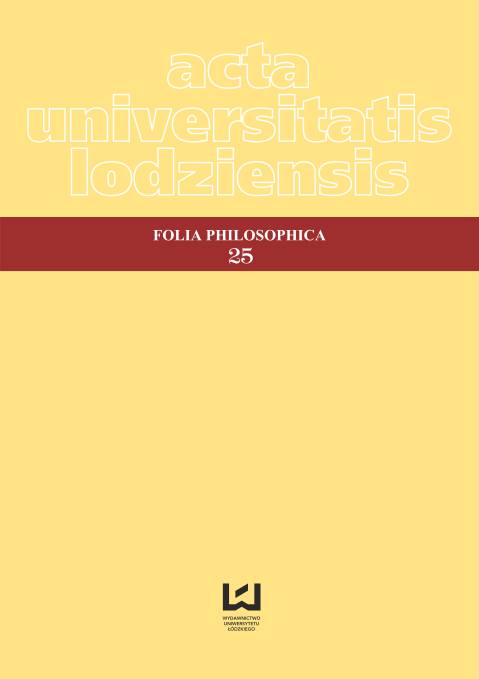Episteologiczny ideał wiedzy i jego odrzucenie
DOI:
https://doi.org/10.18778/0208-6107.25.07Abstract
In the paper I try to present what I termed epistheology in its relation to basic concepts of theory of knowledge: the knowledge itself, its unity and systemic character, criteria of truth and selfevidence, and the questions of justification (of knowledge and criteria of knowledge both) and ethical ideal of knowledge as the contemplation of God's design. Epistheology is thus an epistemic discourse based on and warranted by theological concepts. I analyze Descartes, Malebranche, Leibniz and the like to demonstrate the way this discourse operates. In the second part of the paper I sketch the British approach: empirical, secular, and most importantly based on the concept of verisimilitude. Humean philosophy is in this way not only seen as antagonistic to its continental predecessors, but also victorious as a foundation of new and fertile paradigm of secular science.
Literaturhinweise
Augustyn Wł. 1973, Podstawy wiedzy u Descartesa i Malebranche’a, Warszawa.
Google Scholar
Descartes R. 1960, Zasady filozofii, przeł. I. Dąmbska, Warszawa.
Google Scholar
Descartes R. 1970, Rozprawa o metodzie, przeł. W. Wojciechowska, Warszawa.
Google Scholar
Descartes R. 2001, Medytacje o pierwszej filozofii. Zarzuty uczonych mężów i odpowiedzi autora, Kęty.
Google Scholar
Descartes R. 2002, Reguły kierowania umysłem, Poszukiwanie prawdy poprzez światło naturalne, przeł. L. Chmaj, Kęty.
Google Scholar
Galileusz 1953, Dialog o dwu najważniejszych układach świata, przeł. E. Ligocki, Warszawa.
Google Scholar
Gueroult M. 1955, Malebranche, Paris.
Google Scholar
Hacking I. 1986. Leibniz and Descartes: Proof and Eternal Truths w: A. Kenny (red.) “Rationalism, Empiricism and Rationalism”, Oxford 1986
Google Scholar
Hensoldt A. 2004, Projekt charakterystyki uniwersalnej Gottfrieda Wilhelma Leibniza, „Nowa Krytyka”, 17 (2004), s. 111-139.
Google Scholar
Huet P. D. 1959, Bezwartościowość poznania ludzkiego, w: L. Kołakowski (red.), „Filozofia XVII wieku”, Warszawa 1959.
Google Scholar
Hume D. 1977, Badania dotyczące rozumu ludzkiego, przeł. J. Łukasiewicz i K. Twardowski, Warszawa.
Google Scholar
Leibniz G. 1969, Wyznanie wiary filozofa oraz inne pisma filozoficzne, przekład zbiorowy, Warszawa.
Google Scholar
Leibniz G. 1994, Pisma z teologii mistycznej, przeł. M. Frankiewicz, Kraków.
Google Scholar
Leibniz G. 2001, Nowe rozważania dotyczące rozumu ludzkiego, przeł. I. Dąmbska, Kęty.
Google Scholar
Locke J. 1963, List o tolerancji, przeł. J. Jachimowicz, Warszawa 1963.
Google Scholar
Peirce C. S. 1997, Jak uczynić nasze myśli jasnymi, w: tenże, „Wybór pism semiotycznych”, Warszawa.
Google Scholar
Perzanowski J. 1994, Teofilozofia Leibniza, [dodatek do:] Leibniz, Pisma z teologii mistycznej, Kraków, ss. 243-346
Google Scholar
Popkin R. 1964, The History of Scepticism, Assen.
Google Scholar
Sieczkowski T. 2008, Qui pro quo «Dialogów», czyli pytanie o status teologii naturalnej, „Nowa Krytyka”, 20-21.
Google Scholar
Spinoza 2000a, Etyka, [w:] tenże, „Traktaty”, przeł. I. Halpern-Myślicki, Kęty.
Google Scholar
Spinoza 2000b, Traktat o poprawie rozumu, w: tenże, „Traktaty”, przeł. I. Halpern-Myślicki, Kęty.
Google Scholar
Tuchańska B. 1995, Koncepcje wiedzy apriorycznej i analitycznej a status logiki i matematyki, Łódź.
Google Scholar
Downloads
Veröffentlicht
Zitationsvorschlag
Ausgabe
Rubrik
Lizenz

Dieses Werk steht unter einer Creative Commons Namensnennung - Nicht-kommerziell - Keine Bearbeitung 3.0 International -Lizenz.












